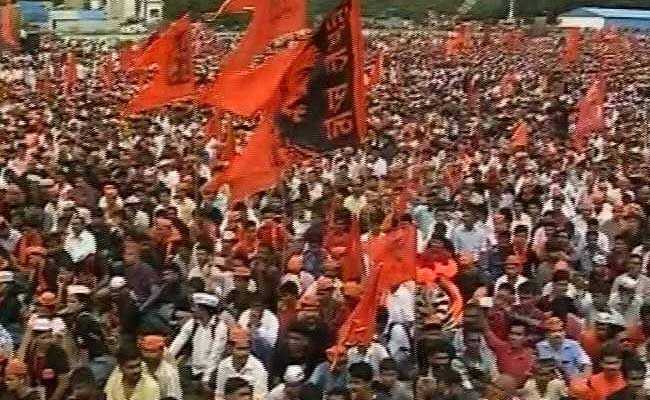
More than 800,000 protesters who are Marathas disrupted Mumbai traffic and strained its railway network on Wednesday as they pressed their demands for reserved quotas in government jobs and colleges for students. The Marathas are a politically powerful group because they constitute 33 percent of Maharashtra’s population. Chief Minister Devendra Fadnavis said that his government supports affirmative action policies for the dominant caste. But he offered no schedule for implementing new policies to benefit Marathas.
Mumbai: More than 800,000 protesters who are Marathas disrupted Mumbai traffic and strained its railway network on Wednesday as they pressed their demands for reserved quotas in government jobs and colleges for students. The Marathas are a politically powerful group because they constitute 33 percent of Maharashtra’s population. Chief Minister Devendra Fadnavis said that his government supports affirmative action policies for the dominant caste. But he offered no schedule for implementing new policies to benefit Marathas
Here is your 10-point cheat-sheet to this big story in the country’s financial capital:
- The protestors – who numbered nearly 900,000 according to the police – marched into Mumbai’s large public park, Azad Maidan, which is located in the heart of South Mumbai.
- Wearing saffron caps and carrying flags, they arrived from all over the state; parking areas across Navi Mumbai were full.
- At the venue where the “Maratha Morcha” began at 11 am, protesters tore banners put up by the Shiv Sena, stressing that they did not want any “political interference” or affiliation.
- This was the first Maratha protest organized in Mumbai and marks the conclusion of a series of 57 marches last year across the state.
- Chief Minister Devendra Fadnavis said on Wednesday that his government has informed the Bombay High Court that it is in favour of extending reservation policies to Marathas. But the Supreme Court has ordered a 50 percent cap on reserved jobs and college seats – a limit that Maharashtra has already reached.
- The previous Congress-led government in Maharashtra had ordered an additional 16 percent reservation for the Marathas not on the basis of caste, but because the group is economically backward – a route attempted often by state governments to circumvent the Supreme Court limit on caste-based reservation.
- The government led by Mr Fadnavis backs that proposal, but it will have to be cleared by the Bombay High Court. The Chief Minister said a new committee of ministers and opposition leaders will meet regularly with Maratha representatives to address their concerns.
- Traffic came to a halt in many parts of the business district, while protesters jammed suburban trains. Young people and senior citizens of the Maratha community waved saffron flags in a protest that the police said was free of incidents of violence, with more than 10,000 policemen on guard.
- Rising unemployment and falling farm incomes are driving farming communities in several states to redouble calls for reservations in jobs and education. The Marathas, traditionally cultivators of sugar cane, also want a waiver for loans given to farmers.
- The city’s famed dabbawalas, who deliver packed lunches to hundreds working in offices across Mumbai, suspended operations for the day, as did hundreds of schools and college in South Mumbai.
